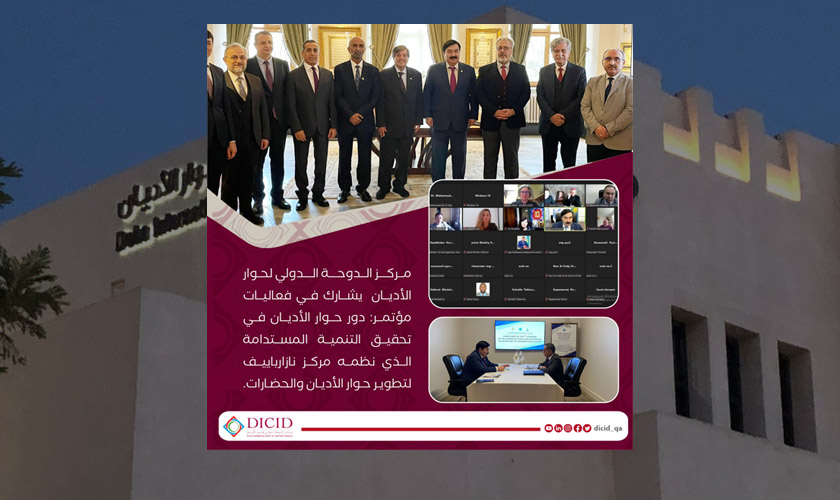
21 May DICID participates in the conference: The Role of Interfaith Dialogue in Achieving Sustainable Development
Doha International Center for Interfaith Dialogue (DICID) participated in an international online conference on the: “Role of Religious Leaders in Achieving Sustainable Development in the World”, held on May 16, 2023, as part of the “Peace Talks” discussion platform. The conference was organized by N. Nazarbayev Center for Development of Interfaith and Civilizational Dialogue.
Members of the DICID staff attended the event on behalf of the center, as instructed by His Excellency Dr. Ibrahim bin Saleh Al Naimi, Chairman of the Board of Directors of the Doha International Center for Interfaith Dialogue.
The event was attended by representatives of state bodies, religious associations of Kazakhstan and the world, participants of the Congress of the Leaders of World and Traditional Religions, scientific and expert community, authoritative speakers of international organizations, and partners of the Center from Egypt, Israel, Qatar, Pakistan, Great Britain, Russia, and Brazil.
The main objective of the conference is to discuss the special role of religious leaders in achieving sustainable development in the world.
It is worth mentioning that His Excellency Dr. Ibrahim bin Saleh Al Naimi delivered a paper entitled: The Role of Religious Institutions and Centers for Interfaith Dialog in Promoting Sustainable Development within the framework of the activities of the International Roundtable at the headquarters of the Research Center for Islamic History, Art and Culture in Istanbul, Turkey. On Wednesday, April 26, 2023. It was organized by the Nazarbayev Center for Development of Interfaith and Inter-Civilization Dialogue (Kazakhstan) jointly with the Research Centre for Islamic History, Art and Culture (IRCICA – Turkey) and was entitled: “The Significance and Recommendations of the Seventh Conference of Leaders of World and Traditional Religions.”
Dr. Al-Naimi particularly welcomed the efforts of religious leaders to promote interfaith, intercultural, and inter-civilizational dialogue, and called for working to protect the environment and work toward sustainable development from a religious perspective. Dr. Al-Naimi pointed to the role of religious institutions and interfaith dialogue centers in achieving sustainable development: “Religious teachings can help achieve the Sustainable Development Goals (SDGs), also known as the Global Goals, adopted by the United Nations in 2015 in its global call to action to end poverty and protect the environment by 2030.”
With this participation, the Center has responded to the recommendations of previous conferences, activating aspects of cooperation between the two parties in particular and between other partners who participated in the event to achieve common interests and visions.



Sorry, the comment form is closed at this time.